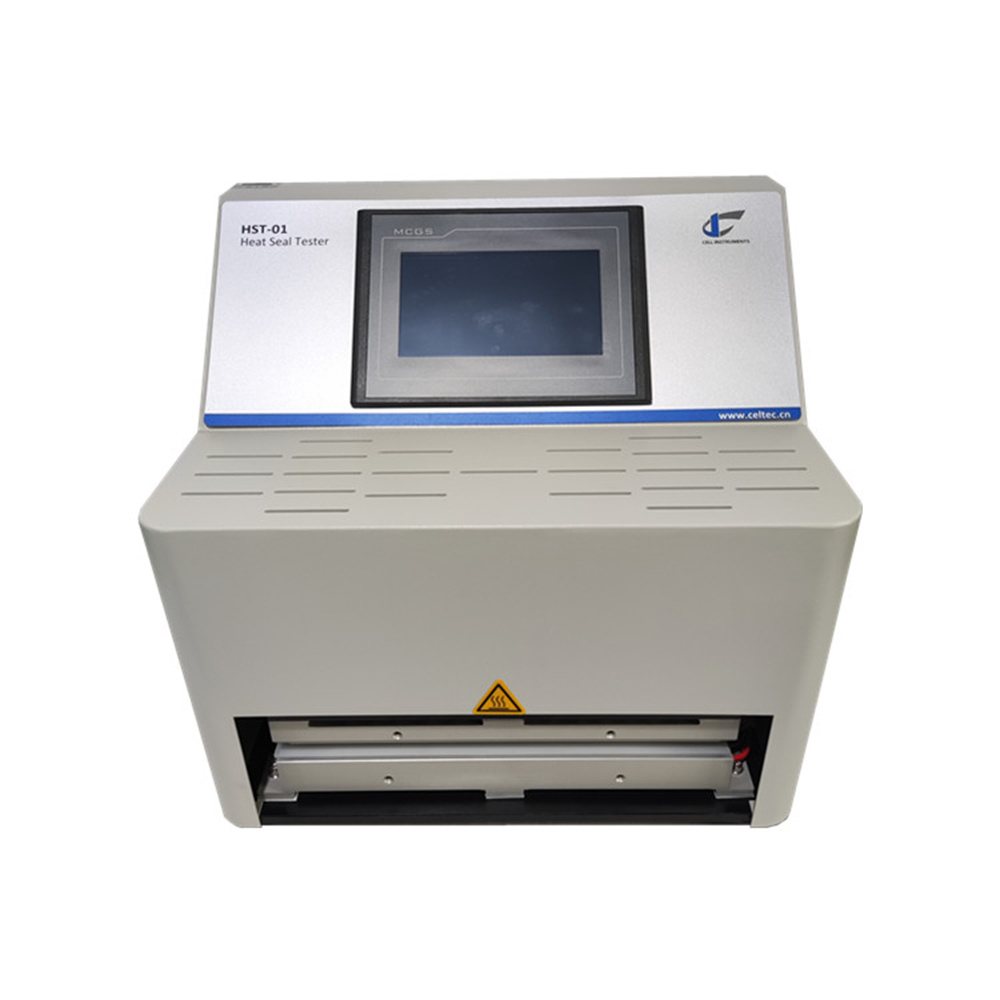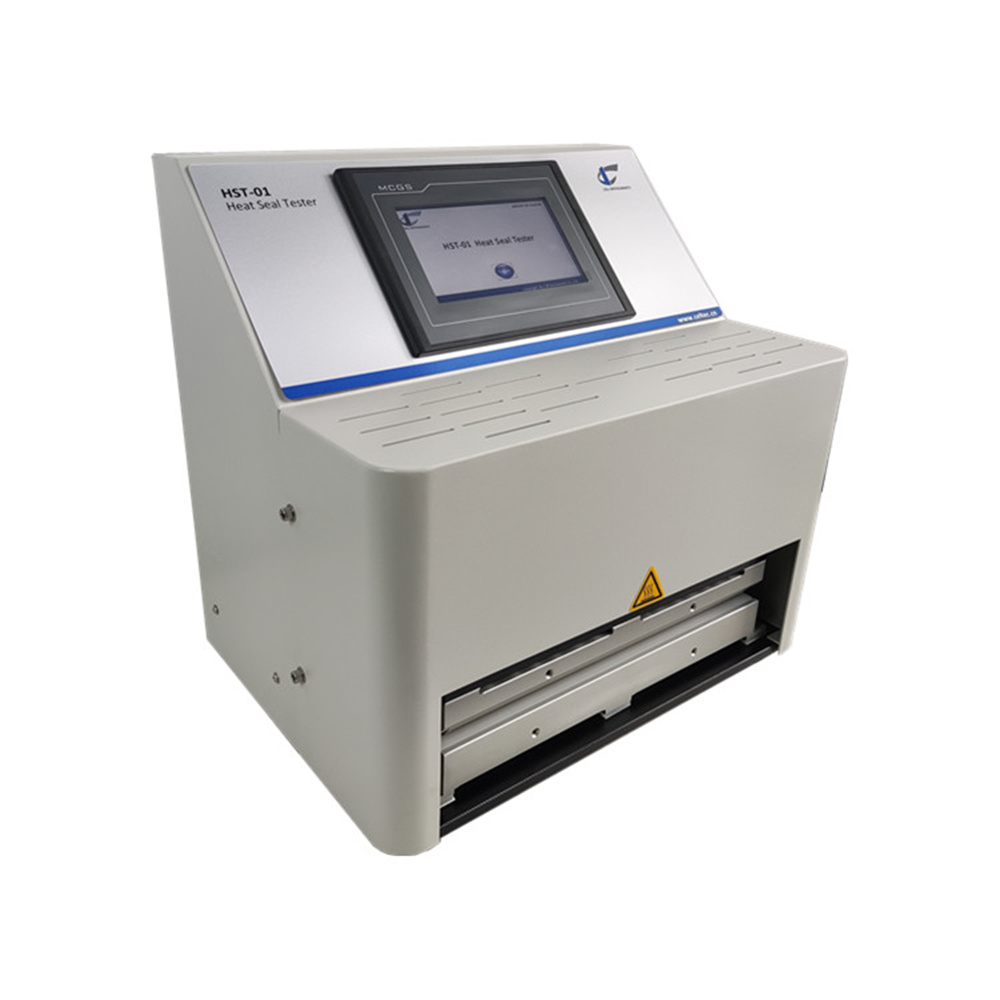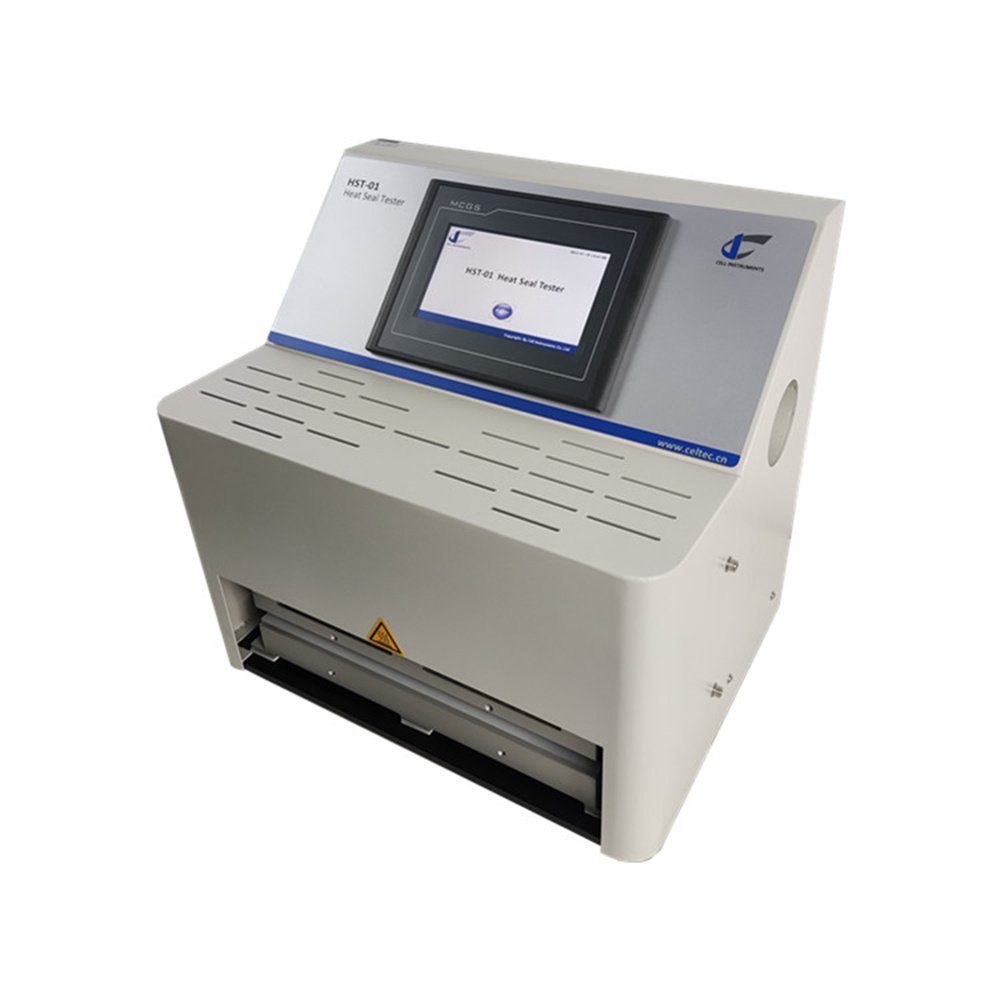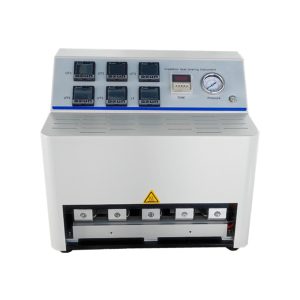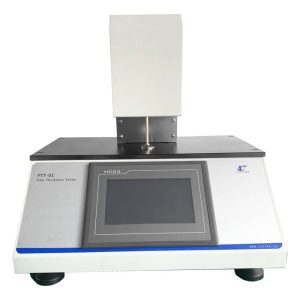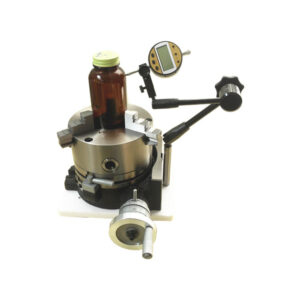مقدمة عن جهاز اختبار الختم الحراري HST-01
ال جهاز اختبار الختم الحراري HST-01 هو جهاز مختبري مصمم لتقييم قابلية الختم الحراري للمواد الحاجزة المرنة، بما في ذلك الأفلام والصفائح والبوليمرات والمركبات. يقوم هذا الجهاز متعدد الاستخدامات بمحاكاة عملية الختم الحراري بدقة من خلال التحكم في ثلاثة معلمات أساسية: الوقت ودرجة الحرارة والضغط. ويتمثل دورها الأساسي في ضمان أن الأختام الموجودة في العبوات المرنة تلبي معايير الأداء الخاصة بالقوة والسلامة، مما يساهم في سلامة المنتج ومدة صلاحيته وسهولة الاستخدام.
تطبيقات جهاز اختبار الختم الحراري HST-01
يعد جهاز اختبار الختم الحراري HST-01 ضروريًا في العديد من الصناعات، بما في ذلك:
- التغليف:تقييم الأختام الحرارية لتغليف المواد الغذائية والأدوية والطبية.
- الأجهزة الطبية:ضمان سلامة الحاجز المعقم في الأكياس الطبية والعبوات البلاستيكية.
- السلع الاستهلاكية:اختبار الأختام على المنتجات الكيميائية اليومية ومستلزمات العناية الشخصية.
- الالكترونيات:تقييم التغليف الوقائي للمكونات الإلكترونية.
- المواد اللاصقة والمركبات:قياس أداء الختم الحراري للمواد المتخصصة.
يضمن الختم الحراري الفعال بقاء المنتجات آمنة وخالية من الملوثات وسهلة الوصول إليها، مما يعزز الجودة الشاملة ورضا المستهلك.
ASTM F2029 وأهميتها في اختبار الختم الحراري
نظرة عامة على معايير ASTM F2029
ال معايير ASTM F2029-16 (2021) معيار، عنوانه الممارسات القياسية لصنع أختام حرارية للمختبرات لتحديد قابلية الختم الحراري للمواد الحاجزة المرنة كما تم قياسها من خلال قوة الختمتحدد هذه المواصفة الطرق المستخدمة لإنتاج وتقييم الأختام الحرارية في مواد التغليف المرنة. وتضمن هذه المواصفة أن تكون الأختام الحرارية متسقة وموثوقة في مختلف التطبيقات.
طرق الاختبار
تحدد ASTM F2029 الظروف الخاضعة للرقابة لصنع الأختام الحرارية، مع التركيز على:
- درجة حرارة:الحفاظ على مستويات الحرارة الدقيقة أثناء عملية الختم.
- وقت:التأكد من تشكيل الختم على مدى مدة زمنية ثابتة.
- ضغط:تطبيق قوة موحدة لتحقيق رابطة موثوقة.
ويتم بعد ذلك تقييم قوة الختم باستخدام طرق مثل:
- اختبار تسرب الهواء.
- اختراق الصبغة.
- التفتيش البصري للاستمرارية والعيوب.
أهمية الامتثال
يضمن الامتثال لمعيار ASTM F2029 إمكانية تكرار نتائج الاختبار وتلبية معايير الصناعة، مما يعزز الثقة في أداء المنتج وجودته.
الميزات الفنية لجهاز اختبار الختم الحراري HST-01
تم تصميم HST-01 بميزات متقدمة تضمن اختبار ختم الحرارة الدقيق والقابل للتكرار:
- التحكم الدقيق:
- مدى درجة الحرارة:درجة الحرارة المحيطة حتى 300 درجة مئوية، مع انحراف ±0.2 درجة مئوية.
- وقت الختم:قابل للتعديل من 0.1 ثانية إلى 9999 ثانية.
- نطاق الضغط: 0.15 إلى 0.7 ميجا باسكال، مما يضمن تطبيق القوة بشكل موحد.
- تصميم عالي الأداء:
- تعمل الفكين المزدوجين المصنوعين من الألومنيوم على تقليل فقدان الحرارة والحفاظ على درجات الحرارة ثابتة.
- يضمن شريط الختم الموجه في ثلاثة اتجاهات توزيع الضغط بشكل موحد.
- أ وحدة التحكم في درجة الحرارة PID يضمن التسخين السريع والدقيق.
- عملية سهلة الاستخدام:
- التحكم PLC مع واجهة شاشة تعمل باللمس HMI سهلة الاستخدام للتشغيل السلس.
- التنشيط اليدوي أو عن طريق مفتاح القدم لتحقيق المرونة أثناء الاختبارات.
- تعطي ميزات السلامة، بما في ذلك الغطاء الأمامي المضاد للحروق، الأولوية لحماية المستخدم.
- خيارات التخصيص:
- فكوك ختم قابلة للتخصيص لتناسب مختلف الأشكال والأحجام والأنماط.
- خياري منفذ RS 232 COM والبرمجيات لتحليل البيانات وإعداد التقارير.
عملية اختبار جهاز اختبار الختم الحراري HST-01
تتم عملية اختبار الختم الحراري بالخطوات التالية:
- إعداد العينة:ضع مادة الاختبار بين فكين متوازيين محكمين ومسخنين.
- إعدادات المعلمة:قم بضبط درجة الحرارة والضغط ووقت الختم المطلوبين.
- ختم:يطبق الفك العلوي، الذي يتم تشغيله بواسطة أسطوانة غاز، ضغطًا على العينة لمدة محددة.
- انتهاء:بعد الوقت المحدد مسبقًا، يعود الفك إلى موضعه الأصلي، وبذلك تكتمل العملية.
- تقييم:يتم تقييم العينة المختومة من حيث القوة والاستمرارية باستخدام طرق مثل اختبارات تسرب الهواء واختراق الصبغة.
تقييم وتحليل الختم الحراري
يتم تقييم جودة الختم من خلال:
- قوة الختم:قياس القوة المطلوبة لكسر الختم.
- الاستمرارية والنزاهة:تحديد العيوب مثل التسريبات أو النقاط الضعيفة.
- التقنيات المتقدمة:الاختراق الميكروبي والتفتيش البصري للتطبيقات عالية الدقة.
وتضمن هذه التقييمات أن التعبئة والتغليف يلبي متطلبات الأداء الوظيفي وتوقعات المستهلكين.
المعلمات والمواصفات الرئيسية
| درجة حرارة الختم. | درجة الحرارة المحيطة ~300 درجة مئوية |
| انحراف | ±0.2 درجة مئوية |
| وقت الختم | 0.1 ثانية~9999 ثانية |
| ضغط الختم | 0.15~0.7 ميجا باسكال |
| فكوك الفقمة | 330*10 مم طول*عرض |
| ضغط الغاز | 0.7 ميجا باسكال |
| حجم المنفذ | خرطوم بولي يوريثين Ф6 مم |
| قوة | تيار متردد 220 فولت 50 هرتز |
لماذا تختار جهاز اختبار الختم الحراري HST-01؟
يوفر HST-01 دقة لا مثيل لها، وثباتًا، وأمانًا، مما يجعله خيارًا مثاليًا للمختبرات وإعدادات مراقبة الجودة. يتوافق مع معايير ASTM F2029 يضمن نتائج موثوقة ومتوافقة مع معايير الصناعة، مما يساعد الشركات المصنعة على الحفاظ على جودة المنتج والأداء.
الأسئلة الشائعة
- ما هو الغرض من جهاز اختبار الختم الحراري؟
- يقوم جهاز اختبار الختم الحراري بتقييم قوة الختم وسلامة مواد التغليف المرنة، مما يضمن سلامة المنتج وأدائه.
- لماذا يعد ASTM F2029 مهمًا؟
- توفر ASTM F2029 ممارسات موحدة لصنع واختبار الأختام الحرارية، مما يضمن نتائج متسقة وقابلة للتكرار عبر الصناعات.
- ما هي المواد التي يمكن اختبارها باستخدام HST-01؟
- يمكن لجهاز HST-01 اختبار الأفلام والصفائح والبوليمرات والمركبات وغيرها من مواد الحاجز المرنة.
- كيف يضمن HST-01 الختم الدقيق؟
- ويستخدم التحكم الدقيق في درجة الحرارة والوقت والضغط، إلى جانب أجهزة استشعار متقدمة ووحدة تحكم PID للحصول على الأداء الأمثل.
- هل يمكن تخصيص HST-01؟
- نعم، يوفر HST-01 فكي ختم قابل للتخصيص وبرامج اختيارية لتحسين الوظائف.

